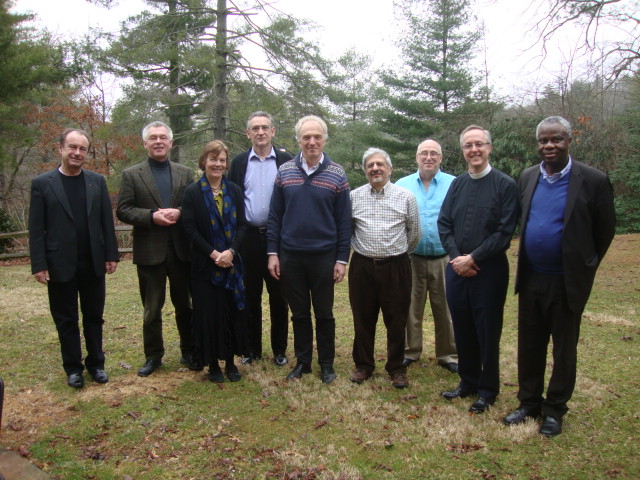In response to an invitation from Mike Klusmeyer, Bishop of West Virginia, members of the International Old Catholic Bishops’ Conference (IBC) visited The Episcopal Church (TEC) in the USA from 7 to 15 March 2015. Bishop Klusmeyer has been the TEC liaison to the IBC for many years and has become a good friend. The delegation consisted of Archbishop Joris Vercammen and Bishops John Okoro, Harald Rein, Dusan Hejbal and Dirk Jan Schoon, who received a warm welcome on their arrival at the Kanuga Conference Center in Hendersonville, North Carolina. During their visit they took part in a theological exchange on the subject of ‘The Church in a secular society’ and attended a meeting of the TEC House of Bishops.
Theological exchange
Four theologians from TEC took part in the exchange of ideas. On Monday 9 March, Dr. Cynthia Kittredge, dean of the Seminary of the Episcopal Church in Austin, Texas, spoke on biblical aspects of power and authority. With reference to various periods in the history of Israel and the Early Church, she pointed out that the impact of Bible passages varied according to the social position of the groups for whom they were written. The following day, Dr. Roger Ferlo, president of the Bexley-Seabury Federation, and Dr. Ian Markham, Dean and President of the Virginia Theological Seminary in Washington, D.C., spoke in response to a presentation by Bishop Harald Rein on secularisation with a particular focus on Switzerland. Dr. Ferlo examined three events that he believes have to do with secularisation: the European Court of Human Rights allowing crucifixes in Italian classrooms because they are seen as an “essentially passive symbol” with no obvious religious influence, an initiative in Switzerland aimed at banning the construction of minarets, and the reactions to the attack on the Charlie Hebdo magazine in Paris. Finally, Dr. Tom Ferguson, Dean for the Bexley Seabury seminary in Chicago and former ecumenical officer for TEC, spoke about the relations between TEC and the Old Catholic Churches of the Union of Utrecht. He explained that the close relationship has a strong connection with the social position of the Old Catholic Church, which – like TEC in the USA – is a minority church in a predominantly secular world. The subsequent readings and discussions confirmed the comparable situations of our churches and showed that they seek the same methods to retain and adapt their identities in a changing environment.
House of Bishops
The Episcopal Church has two chambers of Synod delegates: the first consisting of the bishops, and the second composed of the deans and the representatives of the clergy. The bishops meet twice a year in order to strengthen their shared spirituality with time for reflection and personal prayer, and to discuss church leadership. At the March meeting less time was devoted to the first aspect than usual because a number of important topics had to be discussed. One  whole day was reserved for an exchange of thoughts on the consequences of slavery and the racism that emerged from it – and that remains evident today, as shown by the recent events in Ferguson, Missouri. In the past TEC was often seen as a predominantly ‘white’ Church with many wealthy members who made their fortunes through the labour of black slaves. Another issue on the agenda was the blessing of same-sex relationships and their position in relation to the sacrament of marriage. In some dioceses the differences of opinion are so great that there are fears of a schism. The bishops also discussed the next appointment to the office of Presiding Bishop, as Katharine Jefferts Schori will be leaving the post in the autumn of 2015 after her nine-year term.
whole day was reserved for an exchange of thoughts on the consequences of slavery and the racism that emerged from it – and that remains evident today, as shown by the recent events in Ferguson, Missouri. In the past TEC was often seen as a predominantly ‘white’ Church with many wealthy members who made their fortunes through the labour of black slaves. Another issue on the agenda was the blessing of same-sex relationships and their position in relation to the sacrament of marriage. In some dioceses the differences of opinion are so great that there are fears of a schism. The bishops also discussed the next appointment to the office of Presiding Bishop, as Katharine Jefferts Schori will be leaving the post in the autumn of 2015 after her nine-year term.
Although the TEC bishops may previously have heard of the Old Catholics, some were still unsure as to exactly what Old Catholicism is. We were therefore asked to give a presentation on the Union of Utrecht to the House of Bishops. Archbishop Vercammen described the character of the Union, and Bishop Rein outlined the ecumenical relations of the Old Catholic Churches. Two important topics arose that the TEC and Old Catholic bishops continued to discuss after the presentation. First, the groups in the USA that call themselves ‘Old Catholic’ and claim to belong to the Union of Utrecht even though the European Old Catholics in the USA are in full communion with no other Church than TEC. Second, the situation in Europe concerning the overlapping jurisdictions of Old Catholics and Anglicans for which a solution has yet to be found.
The Old Catholic bishops hope not only that their visit strengthened the relations between the sister Churches, but also that it will help to shape our common course in Europe and the USA in the future.
Amsterdam, March 2015
Dirk Jan Schoon, Bishop of Haarlem

